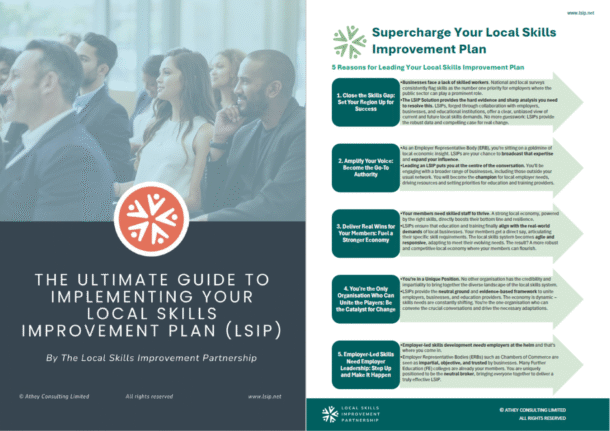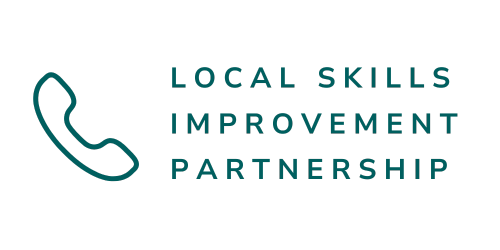What Are Local Skills Improvement Plans?
LSIPs Are Three-Year Plans to Align Training Provision to Employer Needs
A Local Skills Improvement Plan (LSIP) is a three-year plan developed by an Employer Representative Body (ERB) for a specific area in England.
It aims to achieve a better performing local skills system. One that brings together employers, businesses, education and training providers and local government to address current and future skills needs.
Funded by the Department for Education (DfE), LSIPs aim to align post-16 technical education and training provision with the current and future skills needs of local employers and the wider economy.
LSIPs are:
- Employer-led
- Evidence-based
- Action-oriented
- Strategic
- Collaborative
- Up to date and future facing
Start here: Employer Representative Bodies
Some Employer Representative Bodies are tasked with leading and managing Local Skills Improvement Plans. Others are closely involved, and want to work with education and training providers and local authorities to develop a local skills system that reflects members and employers’ needs. Click here to get more information and guidance.
Start here: Education and Training Providers
Education and Training Providers Play a Critical Role in Local Skills Planning, and want robust insights into what skills to plan for and provide. They also want to influence national and local government to provide the powers, funding and statutory roles to meet local employer skills needs. Click here to get more information and guidance.
Start here: Local Authorities
Local Authorities are the custodians of their local economy and community, and want to close the skills gap to set their region up for success, using robust data and a compelling case for change. Local Authorities want their voice to be central to the LSIP process. They also want to make the best use of their local economic and skills funding and to help deprived communities. Click here to get more information and guidance.
Want a Quick Start?
Read in five minutes: our Six-Step Guide to planning an LSIP
Close the Skills Gap: Set Your Region up for Success
Amplify Your Voice: Become the Go-To Authority
Deliver Real Wins for Your Members: Fuel a Stronger Economy
You’re the Only Organisation Who Can Unite the Players: Be the Catalyst for Change
Employer-Led Skills Need Employer Leadership: Step Up and Make It Happen
Want a comprehensive guide?
Register your email in the panel opposite (or below on a mobile device) to access the Ultimate Guide to Local Skills Improvement Plans.
Unsure of where or how to start planning your LSIP? click here to access the Six-Step Guide to Planning your LSIP.
Access the official UK government guidance here.
View the evaluation evidence from the British Chamber of Commerce and read the Association of Colleges Review and Recommendations for Local Skills Improvement Plans.
We would be happy to give you an overview of the process and talk you through how to plan and deliver your Local Skills Improvement Plan.
Just complete the form opposite to get in touch and we’ll email you to set up a meeting.
6 Routes to Elevating Your Local Skills Plan
Time to elevate your Local Skills Improvement Plan (LSIP) to the next level If your LSIP is just a PDF full of stats, you've missed the point. You've got the data - what does it tell you about improving skills provision and utilisation, and what can you do about it?...
𝗖𝗼𝗺𝗺𝗶𝘀𝘀𝗶𝗼𝗻𝗶𝗻𝗴 𝗮 𝗻𝗲𝘄 𝗼𝗿 𝗿𝗲𝗳𝗿𝗲𝘀𝗵𝗲𝗱 𝗹𝗼𝗰𝗮𝗹 𝘀𝗸𝗶𝗹𝗹𝘀 𝗽𝗹𝗮𝗻? 𝘁𝗵𝗲 𝘁𝗼𝗽 𝟭𝟬 asks from 𝗰𝗼𝗻𝘀𝘂𝗹𝘁𝗮𝗻𝘁𝘀
𝟭 - 𝗗𝗲𝗺𝗼𝗻𝘀𝘁𝗿𝗮𝘁𝗲𝗱 𝗘𝘅𝗽𝗲𝗿𝘁𝗶𝘀𝗲 𝗮𝗻𝗱 𝗖𝗿𝗲𝗱𝗶𝗯𝗶𝗹𝗶𝘁𝘆: look for consultants with a proven track record (20+ years of applied experience) in labour markets, skills, and economics, ideally with senior roles in influential organizations. 𝟮 - 𝗘𝘃𝗶𝗱𝗲𝗻𝗰𝗲-𝗕𝗮𝘀𝗲𝗱 𝗮𝗻𝗱 𝗥𝗼𝗯𝘂𝘀𝘁 𝗔𝗻𝗮𝗹𝘆𝘀𝗶𝘀: the...
Start Here for Local Skills Improvement Plans
New to Local Skills Improvement Plans or starting to plan for a refresh? We've put all the essential information on our revamped "Start Here" page at Start here - Local Skills Improvement Partnership A Local Skills Improvement Plan (LSIP) is a three-year plan...
Learn How to Plan your Local Skills Improvement Plan in 10 Minutes With Our Six-Step Guide!
Are you involved in shaping your local skills landscape? Feeling the pressure to effectively align education and training with employer needs? The Local Skills Improvement Plan (LSIP) is your key, but navigating its complexities can feel daunting. Good news! We've...
Education and training providers want these five things from Local Skills Improvement Plans (LSIPs)
Education and training providers want these X things from Local Skills Improvement Plans (LSIPs) 𝟭. 𝗖𝗹𝗼𝘀𝗲 𝘁𝗵𝗲 𝘀𝗸𝗶𝗹𝗹𝘀 𝗴𝗮𝗽: 𝘀𝗲𝘁 𝘆𝗼𝘂𝗿 𝗿𝗲𝗴𝗶𝗼𝗻 𝘂𝗽 𝗳𝗼𝗿 𝘀𝘂𝗰𝗰𝗲𝘀𝘀, 𝗿𝗼𝗯𝘂𝘀𝘁 𝗱𝗮𝘁𝗮 𝗮𝗻𝗱 𝗮 𝗰𝗼𝗺𝗽𝗲𝗹𝗹𝗶𝗻𝗴 𝗰𝗮𝘀𝗲 𝗳𝗼𝗿 𝗿𝗲𝗮𝗹 𝗰𝗵𝗮𝗻𝗴𝗲 To plan and make the case for education and skills provision...
Explained in 3 minutes: Local Skills Improvement Plans
𝙒𝙝𝙖𝙩 𝘼𝙧𝙚 𝙇𝙤𝙘𝙖𝙡 𝙎𝙠𝙞𝙡𝙡𝙨 𝙄𝙢𝙥𝙧𝙤𝙫𝙚𝙢𝙚𝙣𝙩 𝙋𝙡𝙖𝙣𝙨? Local Skills Improvement Plans are Three-Year Plans to Align Training Provision to Employer Needs, Usually Led by an Employer Representative Body (ERB) Aiming Improve the Performance of the Local Skills System. A Local Skills...
Is the Level of Business Engagement Low in Your Local Skills Improvement Plan? How to Boost Engagment
To maximise participation and business engagement in workshops, interviews, and surveys, pitch relevant questions and repeat online events. Consider purchasing business samples from marketing databases to expand reach. Clearly emphasise the research's purpose and...
The UItimate Guide to Planning and Implementing Your Local Skills Improvement Plan
𝗧𝗵𝗲 𝗕𝗲𝘀𝘁 𝗣𝗹𝗮𝗰𝗲 𝘁𝗼 𝗦𝘁𝗮𝗿𝘁 𝗣𝗹𝗮𝗻𝗻𝗶𝗻𝗴 𝗬𝗼𝘂𝗿 𝗟𝗼𝗰𝗮𝗹 𝗦𝗸𝗶𝗹𝗹𝘀 𝗜𝗺𝗽𝗿𝗼𝘃𝗲𝗺𝗲𝗻𝘁 𝗣𝗹𝗮𝗻? 𝗢𝘂𝗿 𝗨𝗹𝘁𝗶𝗺𝗮𝘁𝗲 𝗚𝘂𝗶𝗱𝗲 𝘔𝘢𝘴𝘵𝘦𝘳 𝘺𝘰𝘶𝘳 𝘓𝘚𝘐𝘗 𝘧𝘰𝘳 𝘚𝘪𝘨𝘯𝘪𝘧𝘪𝘤𝘢𝘯𝘵 𝘉𝘦𝘯𝘦𝘧𝘪𝘵𝘴 Leading a Local Skills Improvement Plan is a significant undertaking, but the rewards – a more skilled workforce, a stronger economy, and...
Local Authorities Want These 5 Things from Local Skills Improvement Plans
The next round of Local Skills Improvement Plans (LSIPs) kicks off in Autumn 2025. At the planning stage, it is a good idea to get an understanding of major stakeholder needs and how they can contribute. It is also worth asking how they think you can improve from the...















